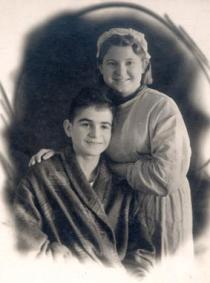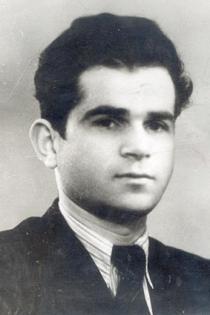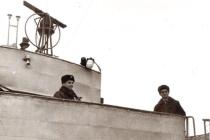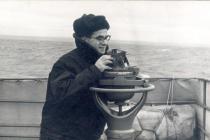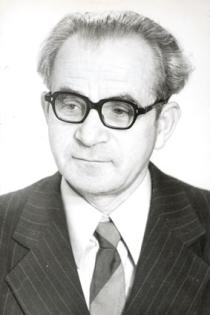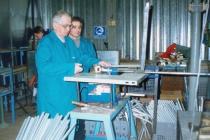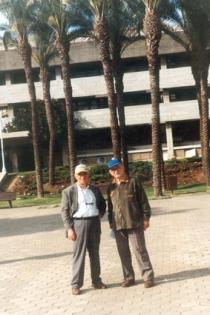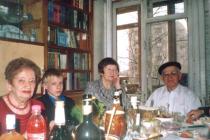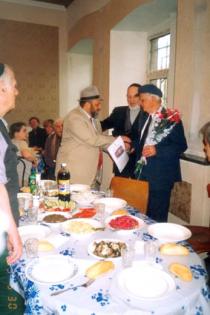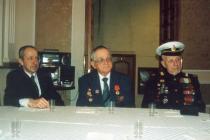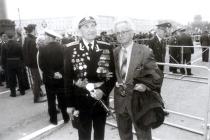This photograph was taken in the military hospital in Kazan. Here you can see me and a hospital nurse (to my shame I don’t remember her name). It was taken by one of the injured soldiers. I’ll tell you now how I managed to get to the hospital.
Before the last fight I participated in, we were assigned a mission: to force a crossing over the river and attack enemy troops on the high opposite bank. They gave each soldier a new submachine gun and two reserve cartridge-drums.
One day before the dawn they gave us combat 100 g of vodka [this portion of vodka was usual for soldiers of the Soviet army before a fight]. Rockets Katyusha started their two-hour preparation fire. [Katyusha was informal name of the soviet rocket launcher mounted on a lorry. In 1941-1945 during the Great Patriotic War they played an important role in operations.] So the soldiers crossed the river and pinned down on the opposite steep bank.
On a signal the platoon went in to the attack. Fascists fired at us using all kinds of weapon: guns, mortars, machine guns. Suddenly a shell explode in front of me, I smelled burning and fell down. By that time our soldiers captured enemy's emplacement, but bombardment went on. After a while sanitary instructor found me and tried to take me away from the battlefield alone. I said 'It's useless, leave me here, call hospital attendants.' He answered 'I have no right to leave you here alone; I am obliged to take an officer to the hospital alive or dead.' Probably he meant the order, notorious as Not retreat a step. [In August 1942 Stalin signed an order #227 more known as Not retreat a step, which allowed commanders and special groups to shoot soldiers who retreated without an order. They considered wounded men who remained on a battlefield to be retreating, too.]
But he did not manage to move me alone, therefore he hardly dragged me into the deep shell-hole nearby and threw branches over me. It happened early in the morning. It became already dark, when I heard a voice 'Comrade commander!' By that time I lost my voice and could not respond. After a while a sanitary instructor and 4 hospital attendants came across me and carried me to the hospital.
It is difficult to imagine hospital if you never saw it. It was a huge tent with operational tables standing very close to each other. At each of them surgeons struggled against death. They sawed off hands and legs, disinfected the intestines which dropped out of the abdominal cavity. Surgeons had no idea about day or night time. They spent all the time at the tables. In my body they found 9 shell splinters. They managed to extract only some of them, the others are still inside my body. They immediately made blood transfusion. Later in hospitals they made it several times more and each time they named the donor. My saviors were women from Vologda, Kostroma and other places of Russia - women exhausted by starvation and uncertainty about destinies of their relatives, who replaced their fighting husbands at workplaces. My gratitude to all of them!
So I had to stay in the front hospital for a month: I was non-transportable. Later I was moved to hospitals in Klimovichi, Tula, Kazan. In the Kazan hospital I spent 6 months. I'll never forget concern shown for wounded men by medical personnel: from a nurse up to the chief medical officer.
While I was in evacuation, studied and was at war, I never came across any manifestations of anti-Semitism. But in hospitals sometimes I felt some anti-Semitic tinge. Wounded men liked to tell funny stories about Jews, where Jews were shown in unfavorable light. Now I understand that they had no malicious intent, some of them probably knew nothing about Jews. But at that time it was very unpleasant to me, because I never came across something similar earlier.
In May 1943 I left the hospital walking on crutches and having a certificate of disabled soldier and 2 government awards: Order of the Great Patriotic War (I Class) and a Medal for Military Merits.

